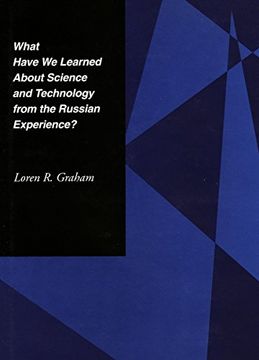Share
What Have we Learned About Science and Technology From the Russian Experience? (in English)
Loren R. Graham (Author)
·
Stanford University Press
· Hardcover
What Have we Learned About Science and Technology From the Russian Experience? (in English) - Loren R. Graham
$ 70.57
$ 88.21
You save: $ 17.64
Choose the list to add your product or create one New List
✓ Product added successfully to the Wishlist.
Go to My WishlistsIt will be shipped from our warehouse between
Monday, June 10 and
Tuesday, June 11.
You will receive it anywhere in United States between 1 and 3 business days after shipment.
Synopsis "What Have we Learned About Science and Technology From the Russian Experience? (in English)"
At the time the Soviet Union broke apart in the late 1980’s, it possessed the largest scientific community in the world. The rapid development, in just a few decades, of such an immense scientific establishment―in a social and economic environment strikingly different from the West―presents an unusual opportunity for the world’s leading authority on Soviet science to examine how the Russian experience sheds light on the status and character of science and technology throughout the world. The book is organized around five questions, each given its own chapter: “Is Science a Social Construction?” “Are Science and Technology Westernizing Influences?” “ How Robust Is Science Under Stress?” “ How Willing Are Scientists to Reform Their Own Institutions?” and “Who Should Control Technology?” The author believes that the Russian example reveals in detail both the strengths and the weaknesses of social constructivism. Though many areas of Russian science show the unmistakable influence of social factors, the deviation of the Soviet Union from standard genetics for many years, followed by its eventual restoration, indicates the weakness of social constructivism and illustrates the relationship of science to reality. He further maintains that although science in Russia has been terribly abused, it nonetheless remains strong; it has proven to be much more resilient than most previous observers believed, and, furthermore, is not nearly as directly dependent on political freedom for its vitality as Western analysts maintained. In the final section, the author makes two strong claims. The first comes from an examination of the social constructivist thesis that science is formed by social influences. His conclusion is that Russian science has indeed been influenced in that country in distinct ways, but not always in a fashion that will please radical social constructivists. The second strong claim is that contrary to the view of many Western scholars that science can flourish only in conditions of nurturing freedom, science turns out to be remarkably robust, able to flourish in adverse conditions.
- 0% (0)
- 0% (0)
- 0% (0)
- 0% (0)
- 0% (0)
All books in our catalog are Original.
The book is written in English.
The binding of this edition is Hardcover.
✓ Producto agregado correctamente al carro, Ir a Pagar.

